Pre-employment screening is vital for recruiters to find the best candidates. It gives a clear picture of the skills and qualities potential hires bring to your company.
This blog post compares Adaface and Byteboard to help recruiters choose the right assessment provider. You'll get insights into features, strengths, and why Adaface might be the better choice.
Table of contents
How does Adaface work?
Adaface is an online assessment platform that helps companies conduct skill-based hiring. By using tailored assessments, Adaface ensures a seamless and effective recruitment process.
Recruiters utilize Adaface to identify top candidates with pinpoint accuracy. The platform’s conversational interface makes the assessments feel more natural, creating a better candidate experience.
Adaface's custom test creation based on job descriptions allows recruiters to match assessments to specific roles. This means candidates are tested on the most relevant skills, improving the quality of the hire.
Among its standout features, Adaface offers a range of coding tests and language tests across different proficiency levels. These tests are scenario-based, providing a holistic view of a candidate's capabilities.
How does Byteboard work?
Byteboard is an assessment platform primarily designed for evaluating software engineering candidates. It offers a unique approach by simulating real-world coding environments and debugging tasks to assess a candidate's skills in a practical context.
The platform enables employers to create coding assessments that replicate the challenges developers face daily. For instance, a recruiter can set up interactive coding exercises that measure not just the ability to write code, but also problem-solving skills in real-time.
One of Byteboard's standout features is its automated scoring system, which simplifies the evaluation process for hiring managers. By providing instant feedback, recruiters can swiftly identify top candidates without getting bogged down in manual assessments.
However, Byteboard has limitations in its assessment coverage. It lacks varied test types like situational judgment, personality tests, and aptitude assessments, which can give a fuller picture of a candidate's fit for a role.
Adaface vs Byteboard: Test libraries
Both Adaface and Byteboard offer a variety of test libraries to cater to different recruitment needs. Adaface covers a broader spectrum including programming, business, aptitude, and personality tests, whereas Byteboard primarily focuses on software engineering tests.
Recruiters can greatly benefit from these test libraries to screen candidates effectively before interviews. Using such assessments helps in identifying the best fit for specific roles, saving time and resources.
Adaface's test library
Adaface’s extensive test library includes over 500 skills tests ready to be used. You’ll find assessments for areas such as programming, artificial intelligence, and role-specific jobs. Here are some highlights:
- Customized tests tailored to job descriptions
- Scenario-based MCQs and coding questions
- Coverage of aptitudes like cognitive abilities, personality, and language skills
Recruiters often choose Adaface for its tailored approach to creating custom assessments. It’s particularly useful for testing a wide range of skills from accounting and finance to typing.
Adaface’s test library in action is seamless. Simply select a predefined test, or let Adaface design a bespoke assessment based on your job description. It’s a versatile tool that adapts to your specific recruitment needs.
Byteboard's test library
Byteboard's test library centers around a single evaluation called CoreEval, which includes a Technical Reasoning Exercise and a Code Implementation Exercise. This is designed to simulate real-world engineering tasks in a controlled environment.
CoreEval is particularly useful for evaluating how candidates approach and solve complex coding problems, simulating day-to-day tasks they would perform on the job. It gives employers a clear view of their technical and problem-solving abilities.
However, Byteboard lacks a variety of assessments beyond software engineering. There are no tests for cognitive ability, personality, or business skills, which can be a limitation when hiring for diverse roles.
Comparison of test libraries
Adaface vs Byteboard: Developer hiring
When hiring developers, you need to assess a candidate’s full range of technical skills to see if they align with your team and workload.
Adaface offers a range of programming-related assessments, including coding challenges, multiple-choice questions (MCQs), and real-world scenarios. Byteboard, on the other hand, focuses more on project-oriented coding questions, which can be lengthier and less versatile.
Hiring developers with Adaface
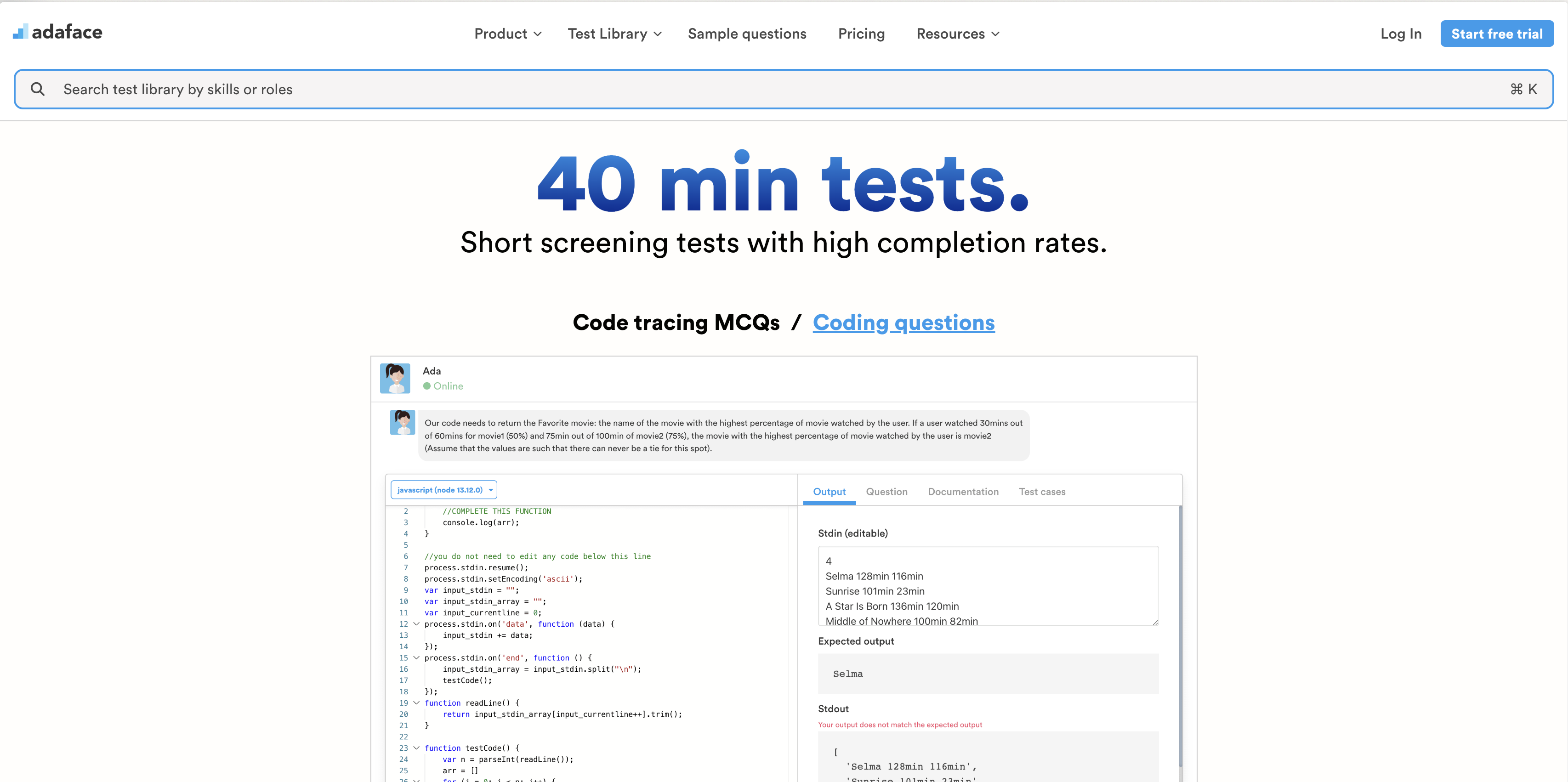
Hiring developers with Byteboard
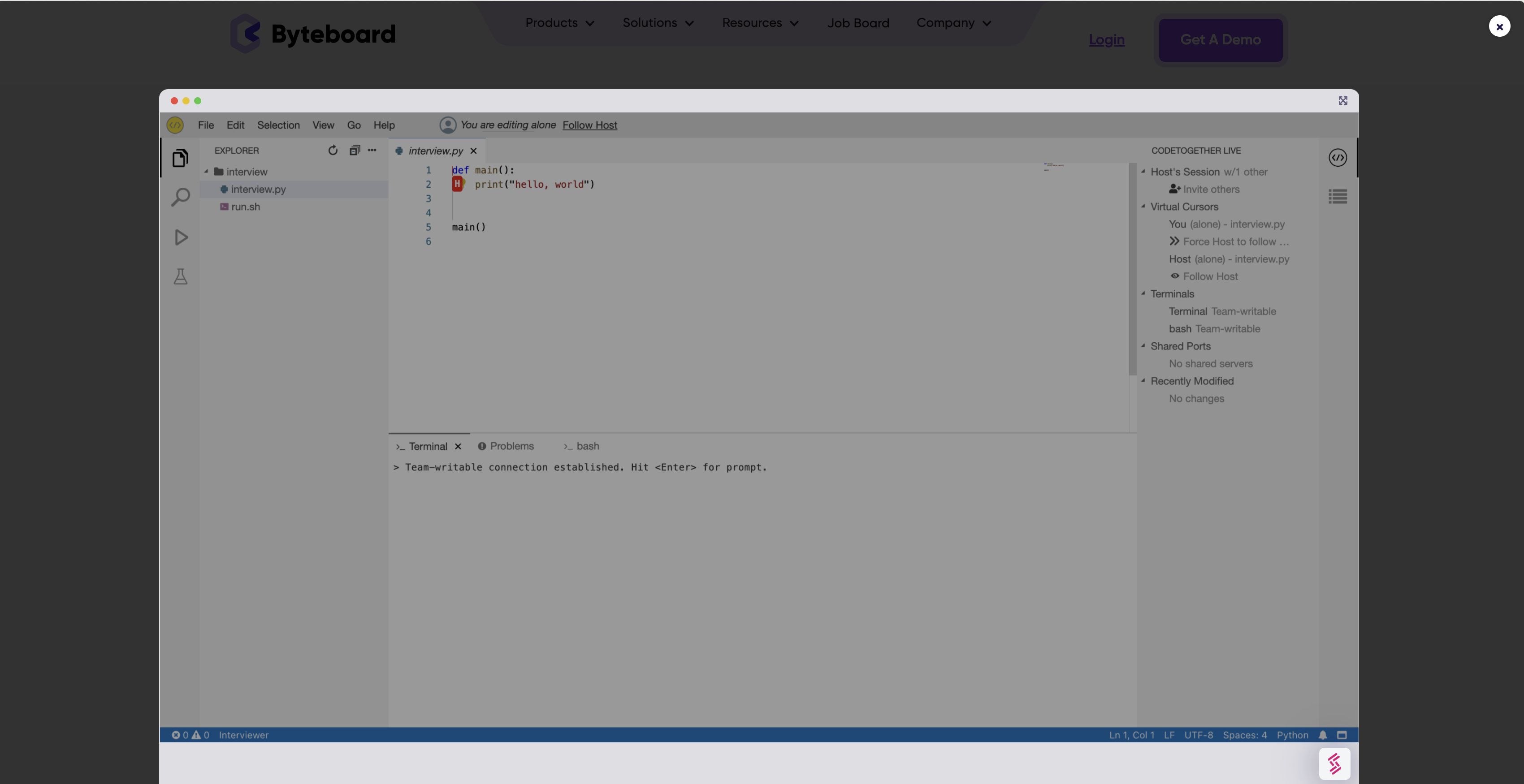
Byteboard provides a decent range of programming assessments, covering key areas like software engineering, data engineering, and site reliability engineering. They utilize a single assignment format for evaluation, which may not fully capture a candidate's breadth of skills.
One of Byteboard's main selling points is its test library, which includes questions on programming languages, web frameworks, and data structures. This can help employers gauge specific technical skills, but it lacks the flexibility of integrating customized challenges tailored to unique job requirements.
However, Byteboard falls short in areas like code playback and providing custom coding questions, which can be essential for a thorough evaluation of a developer's coding journey. Additionally, the absence of certain anti-cheating measures raises questions about the integrity of the assessment process.
Comparison of developer hiring features
Adaface vs Byteboard: Candidate experience and company branding
Candidate experience is at the heart of recruitment success. If the journey feels tedious or unfriendly, candidates might walk away, leading to a significant talent drain.
Aspiring employers should focus on aspects that make candidates feel valued. Features such as mobile compatibility, timely support, and a streamlined interface often make a huge difference in retaining candidate interest.
Candidate experience and company branding with Adaface
Adaface excels in providing a fantastic candidate experience. Let's start with their conversational interface. Rather than feeling like a pop quiz, Adaface tests engage candidates in a chat-like format, which makes the process friendly and less daunting.
Next up is Adaface's mobile-friendly design. Candidates can complete their assessments on any device, providing them the flexibility they need in today's on-the-go world. This ensures that candidates are not restricted to their desktops, making the process hassle-free.
Lastly, Adaface's typical assessment length of 40 minutes strikes the perfect balance between depth and brevity. Long enough to gauge essential skills but short enough to maintain high completion rates. Learn more about improving candidate experience.
Candidate experience and company branding with Byteboard
Byteboard offers candidates an assessment experience that is straightforward but not particularly innovative. Their tests are designed to be taken on a desktop and lack mobile support, which can be a limitation for candidates who prefer flexibility. The typical assessment length is around 1.5 hours, which may be a bit long for some candidates.
Candidates receive email support for any queries they might have, and there is help documentation available online to assist them during the test. This provides a basic level of support and ensures that candidates are not left in the dark. However, the absence of a conversational interface means the assessments might feel more like traditional exams rather than engaging experiences.
One area where Byteboard falls short is the lack of qualifying questions at the start of the test. This means candidates might spend time on a test only to find out later that they don't meet the basic criteria. Additionally, they do not offer frequently asked questions support, which could leave candidates waiting longer for answers to common queries.
Adaface vs Byteboard: Anti-cheating features
In the world of online assessments, maintaining the integrity of test results is paramount. Recruiters need tools that can effectively prevent cheating to ensure that they make informed hiring decisions based on genuine candidate performance.
Anti-cheating features of Adaface
Adaface offers a suite of anti-cheating features that make its proctoring capabilities standout. These features include:
- Non-googleable questions to ensure that candidates cannot easily search for answers online
- Email authentication before the test starts to verify the candidate's identity
- Web and webcam proctoring to monitor candidates' screen activities and physical presence
- IP and location logging to track where the candidate is taking the test from
- Device fingerprint tracking to detect if the same device is used for multiple tests
- Copy-paste protection and full-screen enforcement to prevent candidates from cheating through other applications or browsers
- Chat GPT protection to monitor switching to tools like Chat GPT during the test
- Multiple question sets and a large question bank to minimize question leakage
- Plagiarism detection to catch similar coding answers
- Social listening for task leaks to proactively swap compromised questions
- Question and answer integrity settings to prevent answer leakage
A standout feature of Adaface's anti-cheating arsenal is its comprehensive proctoring suite, combining web and webcam monitoring to ensure that candidates stay within the test environment without seeking external help. This is bolstered by features like copy-paste protection and full-screen enforcement, which prevents candidates from using other windows or apps during the test.
Moreover, Adaface goes a step further with its location and IP tracking, and device fingerprinting. These tools help in identifying suspicious activities such as multiple candidates taking tests from the same location or device, thereby adding an extra layer of security.
For more details about Adaface's proctoring features, visit Ensure accurate assessments with remote proctoring features or read Everything you should know about online proctoring.
Anti-cheating features of Byteboard
Byteboard employs user authentication and webcam proctoring as its primary anti-cheating features. These tools help ensure that the person taking the test is who they claim to be, and that they remain present throughout the assessment.
The webcam feature adds a layer of security by allowing recruiters to visually confirm candidate identity and presence. This can be especially useful in remote assessments where the risk of outside assistance is higher.
However, Byteboard lacks some advanced proctoring options like IP address tracking and device fingerprinting, which could offer deeper insights into test integrity. Without these features, there might be a higher chance of candidates finding ways to cheat or collaborate during assessments.
Comparison of anti-cheating features
Adaface vs Byteboard: Pricing and free trial
Adaface vs Byteboard: pricing. When considering assessment platforms, recruiters should anticipate various pricing plans that cater to different hiring needs and budgets.
Adaface pricing
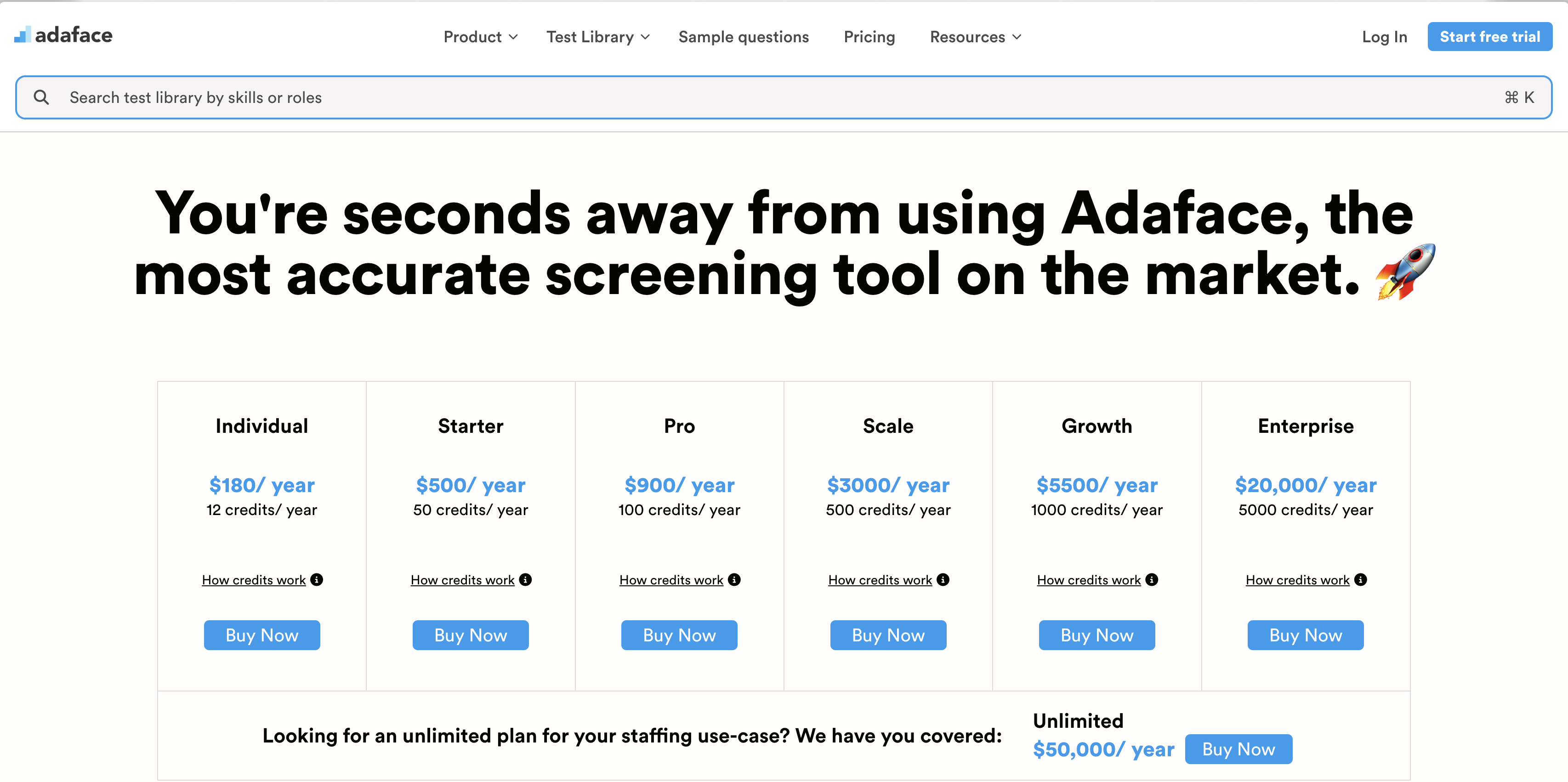
Adaface's pricing is structured to provide flexibility and value, catering to organizations of all sizes. Our plans include options for startups to large enterprises, ensuring there's a suitable plan for every business.
We offer a range of plans: Starter at $500 for 50 credits, Scale at $3000 for 500 credits, Growth at $5500 for 1000 credits, and Enterprise at $20000 for 400 credits. For those with extensive hiring needs, we also provide an Unlimited plan at $50000 per year.
For more details, you can check out our Adaface Pricing page. With transparent pricing and no hidden costs, recruiters can easily choose a plan that best fits their hiring demands.
Byteboard pricing
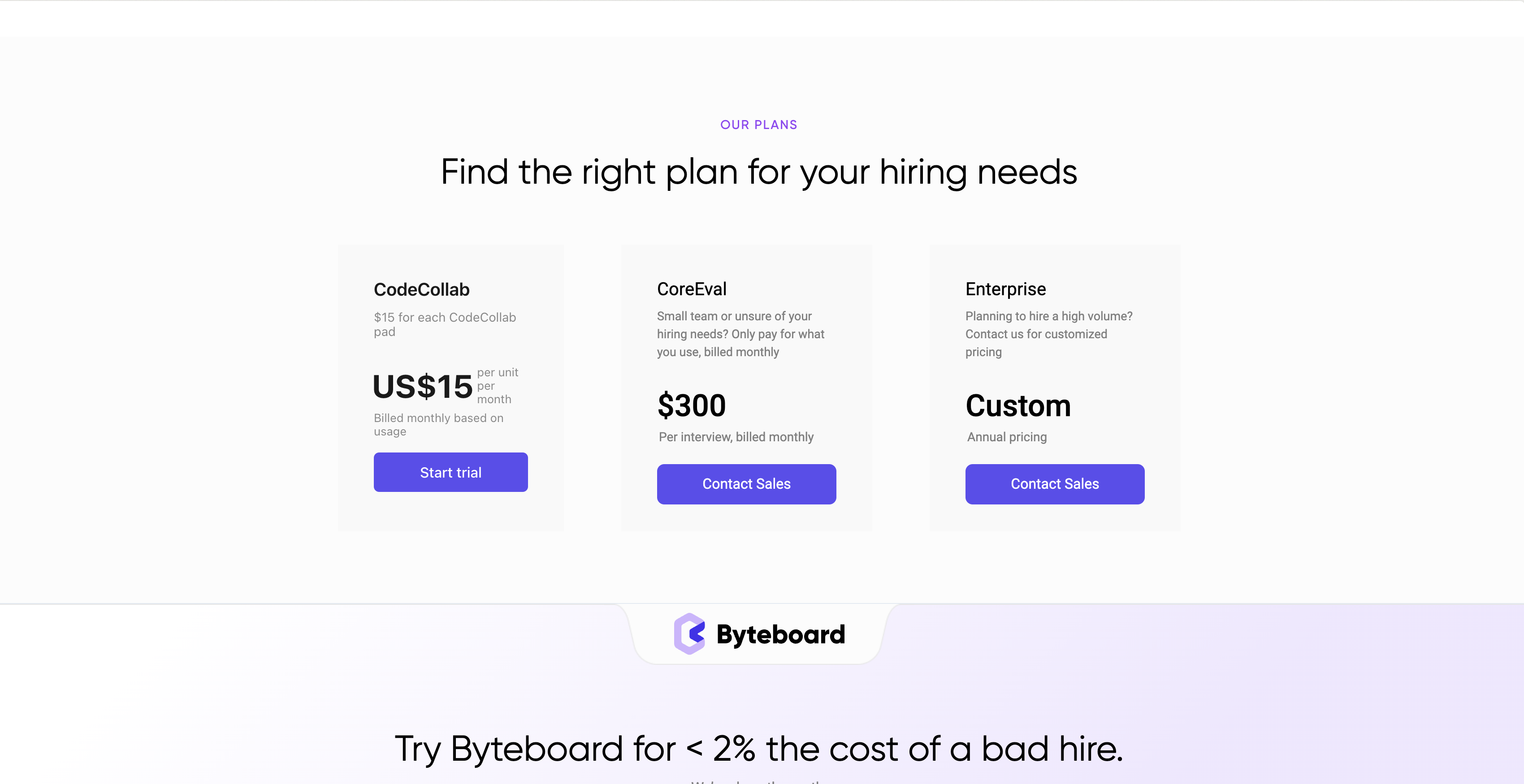
Byteboard's pricing structure can be a bit of a mystery, as it lacks clear details on its website. However, the basics are as follows: - CodeCollab starts at $15 per unit - CoreEval begins at $300 per interview. Interested customers must hop on a sales call to get tailored pricing, which can make planning a bit tricky.
While Byteboard offers a free trial for CodeCollab, it doesn't provide a way for users to explore all features or sign up easily without a sales call. This can leave recruiters feeling a bit in the dark when trying to assess whether Byteboard fits their needs before making a commitment.
Comparison of pricing
Adaface vs Byteboard: Enterprise and startup friendliness
When choosing an assessment provider, both enterprises and startups look for features that cater to their unique needs. A user-friendly interface, seamless integration with existing HR systems, and compliance with data protection regulations are some of the primary considerations.
Adaface's enterprise and startup friendliness
Adaface offers seamless ATS integration, ensuring that enterprises can manage their hiring processes without leaving their HR systems. This integration streamlines the workflow and enhances the overall user experience.
For startups, Adaface provides unlimited team seats in all plans, ensuring growing teams don't face additional costs as they expand. Additionally, role-based access helps both startups and enterprises manage permissions and user access effectively.
Adaface also supports custom data location, allowing enterprises to keep their data within their own country, adhering to local laws and regulations. This feature, combined with priority support, makes Adaface a preferred choice for companies of all sizes.
Byteboard's enterprise and startup friendliness
Byteboard offers features like ATS integrations with systems like Greenhouse and Workable, along with GDPR compliance to keep enterprise users in the clear. However, it lacks a public API and role-based access, which can limit customization for startups and larger enterprises alike.
For companies looking to streamline their hiring, Byteboard's integrations with popular ATS platforms allow teams to manage assessments directly within their existing systems. This makes it easier for recruiters to keep everything in one place, but it may not provide the flexibility that some businesses need.
While Byteboard supports priority support for enterprise users, it misses the mark on offering multiple question sets or bulk actions. This can pose challenges for businesses that need to hire at scale or want to maintain a diverse testing approach while keeping track of candidate progress.
Comparison of enterprise and startup friendliness
Adaface vs Byteboard: Customer support
Adaface vs Byteboard: Customer support is like the friendly guide on a treasure hunt; it helps recruiters navigate the assessment process smoothly and ensures they can make the most of the platform's features.
Adaface's customer support features
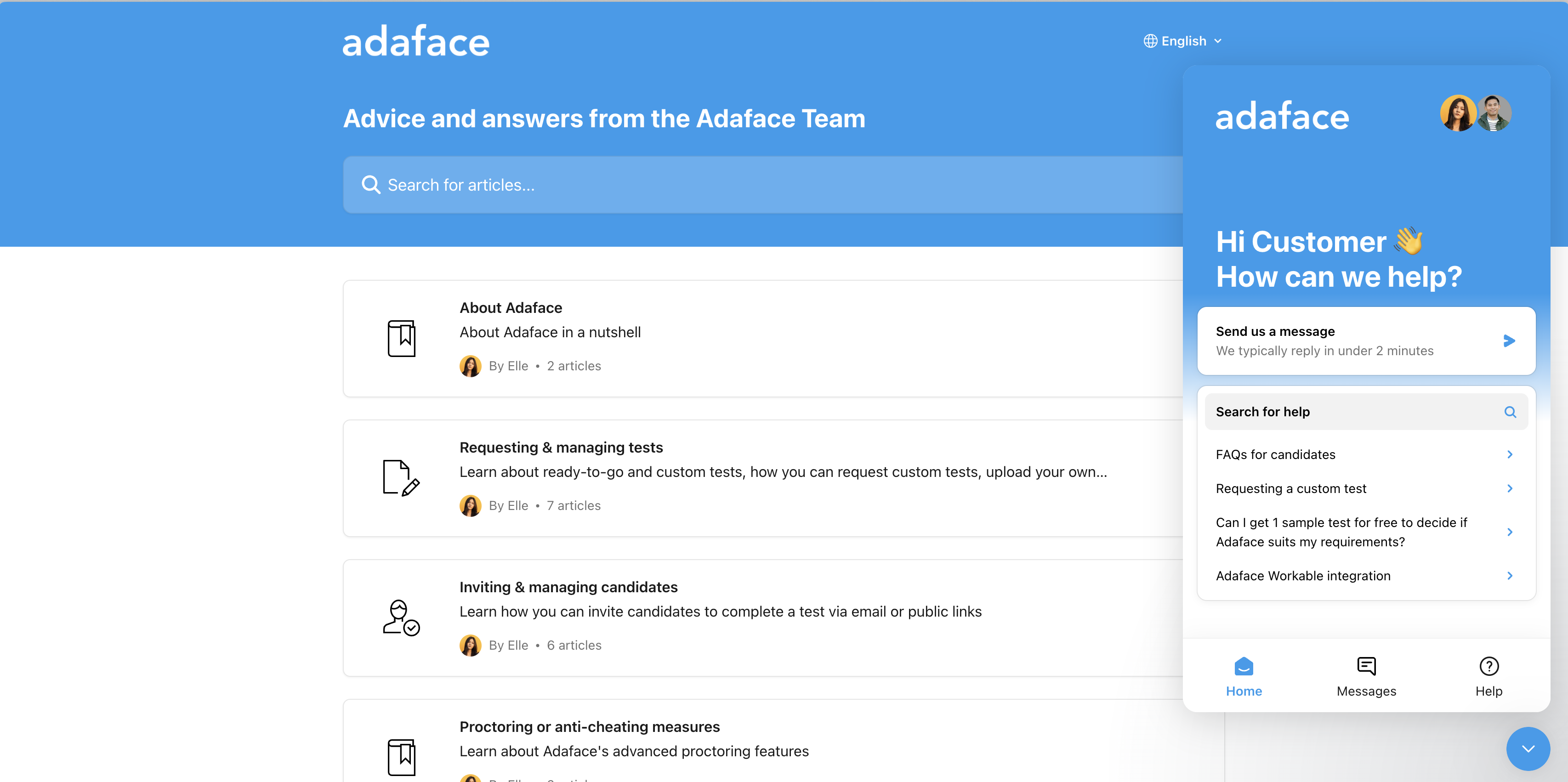
Adaface offers live chat for quick responses, email support for detailed inquiries, and a handy Help Center packed with resources to assist users every step of the way.
Plus, Adaface provides onboarding training to make sure recruiters feel confident using the platform from day one. It’s like having a personal coach for your hiring journey!
With Adaface, recruiters can tap into a treasure trove of resources, from the Adaface Product Tour to guides on how to hire the right candidate, ensuring they're well-equipped to find top talent.
Byteboard's customer support features
Byteboard offers email support and provides training and onboarding for recruiters using their platform.
However, Byteboard lacks live chat and a help center, which could make it challenging for users to get immediate assistance or find answers to common questions.
Comparison of customer support
Adaface vs Byteboard: Conclusion
Both Adaface and Byteboard offer programming tests, web framework questions, and automated scoring. They provide reliable evaluations of candidates' technical skills.
Despite these similarities, Adaface excels in offering a more comprehensive range of tests, including situational judgment, aptitude, business, and personality assessments.
Byteboard lacks features like situational judgment tests, typing tests, and custom question support. These missing elements can be important for a well-rounded candidate evaluation.
Streamline hiring with skill tests
Adaface covers all these areas and more, making it a versatile choice for various recruiting needs. Its ability to provide custom tests tailored to job descriptions further sets it apart.
Pre-employment assessments help recruiters evaluate culture fit, cognitive ability, and job-specific skills. This leads to more informed hiring decisions.
Using these assessments, recruiters can save time and reduce biases, ensuring they select the most qualified candidates. This streamlined process enhances overall recruitment efficiency.
Adaface emerges as a comprehensive solution with its wide array of features and customizability. To learn more, check out Adaface Skills Assessment Tools or visit our Pre-Employment Blog for more insights.
Adaface vs Byteboard FAQs
Adaface offers a wide range of tests including programming, situational judgment, aptitude, business, personality, language, and more. Byteboard primarily focuses on programming tests.
Adaface allows you to add custom questions tailored to your specific needs. Byteboard does not offer custom questions.
Adaface supports mobile-friendly assessments for most test types, while Byteboard does not offer mobile-friendly options.
Yes, both Adaface and Byteboard offer various proctoring features like web and webcam proctoring.
Adaface assessments generally take around 40 minutes, whereas Byteboard assessments can take up to 1.50 hours.
Yes, both Adaface and Byteboard integrate with popular ATS systems like Greenhouse and Workable.

40 min skill tests.
No trick questions.
Accurate shortlisting.
We make it easy for you to find the best candidates in your pipeline with a 40 min skills test.
Try for freeRelated posts



